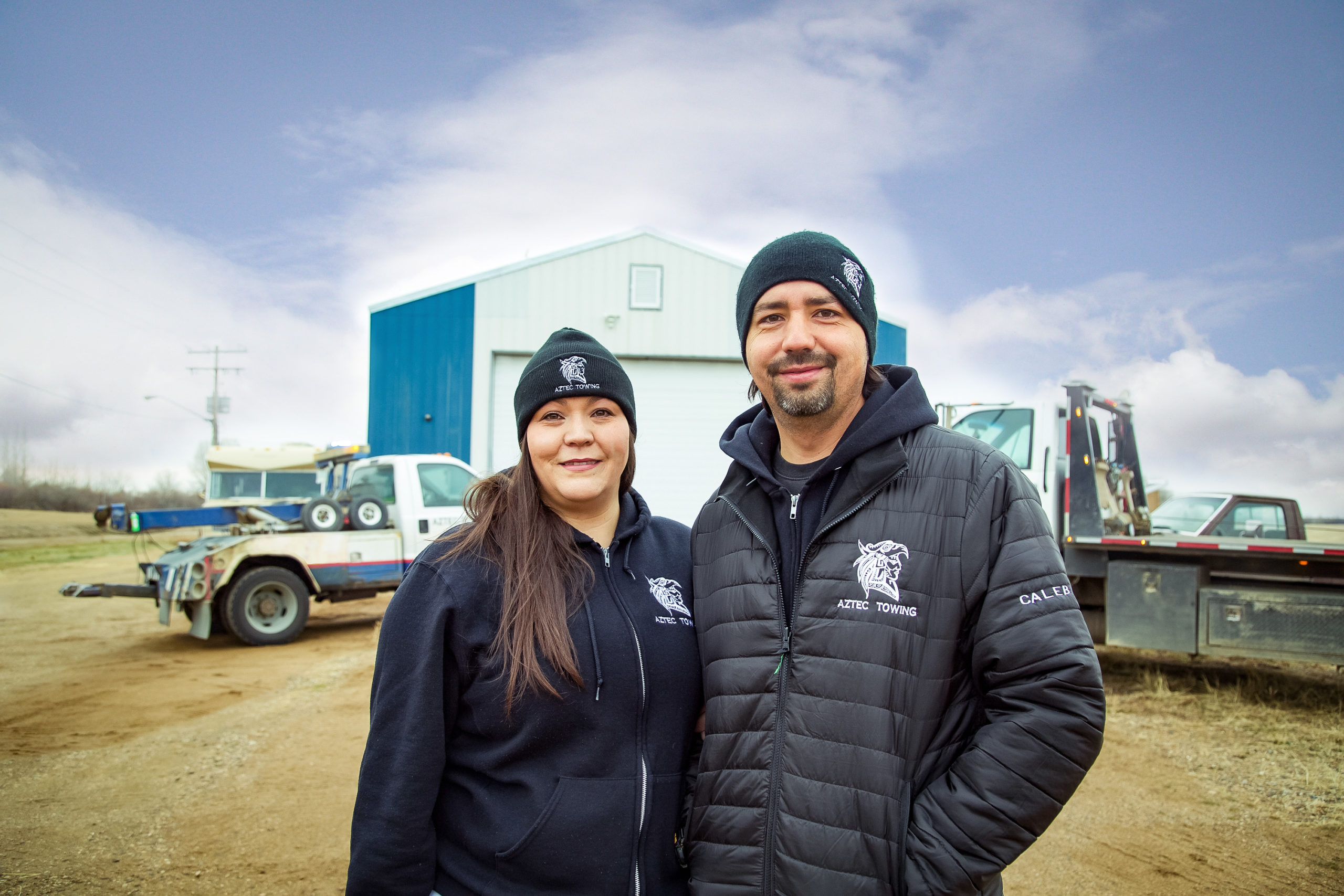Caleb Warkentin’s first day with Aztec Towing was a memorable one.
Blizzard-like conditions made driving in the Blaine Lake area hazardous. One driver slid into a ditch and was in need of a tow. He called Aztec Towing.
Two hours later, following a gruelling effort to pull the vehicle to safety, Caleb finally was able to pull the car from the ditch and onto the road.
“As soon as I got him out of the ditch and onto the road again, he tells me he doesn’t have any money to pay me,” Caleb remembered. “I just spent two hours getting this guy out of the ditch and now he tells me this? I couldn’t just let him go.”
Grateful, the man offered Caleb two otter skins as a down payment on what he owed.
Caleb hesitated but eventually accepted the offer.
“I took the skins and I told him I needed to get paid by the end of the week. He said that wouldn’t be a problem and that he’d be in touch …. Yeah, I never heard from this guy again.”
Aztec Towing is a family-owned and operated business in Blaine Lake. Caleb and his sister Karleigh Warkentin (Sanchez) purchased the business and opened in November 2016. Business has been steady ever since.
“Fortunately, we’re getting paid more than just otter skins these days,” Caleb said.
The previous owner of the towing company was looking to sell for several months before Caleb and Karleigh got serious about buying. They saw the opportunity of operating a towing business in a small town, so they immediately looked into options for funding aboriginal businesses.
They contacted SIEF and immediately delivered an application. After their application was approved, SIEF provided 60 per cent in grant money to purchase the towing company. Caleb and Karleigh’s mom provided the down payment.
Caleb and Karleigh inherited two towing trucks and an impound lot with their purchase. It’s the only SGI-accredited lot in the area. As well, it is the primary contact for the local RCMP for impounded vehicle storage and for CAA and any roadside assistance providers.
“Without the help from SIEF the possibility of buying the towing company just wasn’t there,” Karleigh said. “This wouldn’t have happened without SIEF. We would have missed the opportunity and we maybe wouldn’t be sitting here right now. Who knows what would have happened?”
Without question, Caleb and Karleigh find themselves on a much better life path than they were on close to 20 years ago when living in Calgary.
“Growing up with a single mom on welfare and a developmentally delayed brother, Caleb and I were left to fend for ourselves a lot of the time,” Karleigh explained of their teenage years. “We probably did a lot of things we shouldn’t have done and probably lived a lifetime by the time we were in our early 20s.”
The pair found the Ghost River Rediscovery Society, a network of programs aimed at reconnecting urban aboriginals to their culture through cultural activities like drumming and singing, arts and beading.
“This took us off the path we were going down and into a more level-headed space, “Caleb said. “We became focused on what we wanted in life.”
In Calgary, Caleb started working with a framing company before he moved back to Saskatchewan and started Aztec Framing with Mauro Sanchez, his brother-in-law and Karleigh’s husband. Caleb’s wife, Melvy Sanchez (Warkentin) is Mauro’s sister. They’re originally from Bolivia. All four are involved with Aztec Framing and Aztec Towing.
Aztec Framing kept everyone busy through the spring and summer months. However, business would slow down during the winter. Hence, the interest in starting a towing company and maintaining a steady stream of income throughout the year.
SIEF also provided financial relief earlier this year for small businesses that were struggling as a result of the Covid-19 province-wide shutdown.
Fear, anxiety and a lot of uncertainty about the future of the company set in. The Emergency Loan Program, a component of Indigenous Business Stabilization, was introduced to assist Indigenous-owned businesses negatively affected by the pandemic.
Aztec Towing was a recipient of a loan through this program.
“If it wasn’t for SIEF and that relief, I’m not sure where we’d be right now,” Karleigh said. “It was a very stressful time. Business would have eventually picked up, but we would have been so far in the hole by then.”
“We had payments due on the trucks, insurance on the trucks, payments due for the shop. Plus, we have children to feed. SIEF came through and made a huge difference. They helped us on the road to success.”

